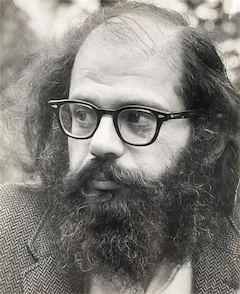
Allen Ginsberg (1926-97, age 71). An American poet and writer whose groundbreaking work “Howl” catalyzed the Beat Generation movement and fundamentally transformed American poetry.
Born Irwin Allen Ginsberg in Newark, New Jersey, Allen Ginsberg emerged as one of the most influential voices of 20th-century American literature, challenging conventional literary forms and social norms through his confessional, politically charged verse [Luce Index™ score: 89/100].
Allen Ginsberg attended Columbia University in the 1940s, where he formed crucial friendships with William Burroughs, Jack Kerouac, and Lucien Carr, establishing the core of what would become the Beat Generation.
Initially intending to study law, Ginsberg switched to literature, setting the foundation for his revolutionary poetic career. His early exposure to Walt Whitman’s work profoundly influenced his expansive, free-verse style and democratic poetic vision.
Allen Ginsberg was the second son of Louis Ginsberg, also born in Newark, a schoolteacher and published poet, and the former Naomi Levy, born in Russia and a fervent Marxist. His parents were two Jewish members of the New York literary counterculture of the 1920s, Ginsberg was raised among several progressive political perspectives.
As Time magazine mentioned on Oct. 7, 1955, “In his childhood and adolescence, Ginsberg grew up in a Jewish communist home, which combined socialist outlooks with mild Jewish traditionalism.”
His Jewish heritage was significant to his work – he wrote the famous poem “Kaddish” as an elegy for his mother, drawing on the Jewish prayer for the dead.

The pivotal moment in Ginsberg’s career occurred on October 7, 1955, when he first read “Howl“ at San Francisco‘s Six Gallery. This legendary performance, attended by fellow Beat poets including Gary Snyder and Michael McClure, marked the public debut of a poem that would define a generation.
“Howl“ began with the famous line “I saw the best minds of my generation destroyed by madness,” capturing the disillusionment and spiritual searching of post-war America.
Ginsberg’s poetry confronted taboo subjects with unprecedented frankness, addressing homosexuality, drug use, and mental illness at a time when such topics were largely suppressed in mainstream literature.
In 1943, he discovered within himself “mountains of homosexuality” and expressed this desire openly and graphically in his poetry. His openness about his sexuality made him a pioneering figure in LGBTQ+ literature, paving the way for future generations of queer writers.
The poet‘s personal life was deeply intertwined with his artistic vision. In 1954, Ginsberg moved to San Francisco, where he met the poet Peter Orlovsky. They fell in love and were lifelong partners. Ginsberg lived with his “life-long love” Peter Orlovsky from August 1958 to March 1961 in a New York City tenement, and their relationship lasted over four decades. He also struck a note for gay marriage by listing Peter Orlovsky as his spouse in his Who’s Who entry.
Ginsberg’s political activism was inseparable from his poetry. He vigorously opposed militarism, economic materialism, and social conformity, becoming a prominent figure in the counterculture movement of the 1960s. His poem “America” (1956) exemplified his critical stance toward American society, questioning the nation’s values and priorities with characteristic directness and humor.
The poet‘s literary achievements earned significant recognition. In 1974 he won the National Book Award for The Fall of America. His additional notable works include “Reality Sandwiches“ (1963) and “Mind Breaths“ (1978), which continued to explore themes of spirituality, politics, and personal transformation.
Ginsberg’s influence extended beyond literature into music, visual arts, and popular culture. He collaborated with musicians like Bob Dylan and The Clash, bridging the gap between literary and popular culture. His advocacy for Buddhism and Eastern spirituality introduced many Americans to alternative philosophical traditions.
The poet’s commitment to free expression led to numerous legal battles, particularly surrounding the publication of “Howl,” which faced obscenity charges in 1957. The subsequent trial and acquittal established important precedents for artistic freedom in America, cementing Ginsberg’s role as a defender of First Amendment rights.
Allen Ginsberg died on April 5, 1997, in New York City, leaving behind a vast literary legacy that continues to influence writers, activists, and artists worldwide. His fearless exploration of taboo subjects, innovative poetic techniques, and unwavering commitment to social justice established him as one of America‘s most important literary figures.